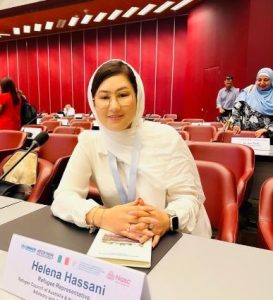Refugee following her passion to defend human rights
Seeing injustice in her own Afghan community has driven Helena Hassani to become one of Australia’s leading experts and advocates against child and forced marriage.
She and her family arrived in Australian in 2009 after a decade as asylum seekers in Pakistan.
“I studied Human Rights law with the thought of going back to Afghanistan to become a human rights advocate, especially for women and children,” Helena said.
“But with the return of the Taliban, that dream was shattered. So, I changed my path and my future career thinking.
“I decided I would work in Australia on child and enforced marriage and family violence. My vision was to gain experience and expertise in combating child and enforced marriage which is prevalent in the Afghan community and other CALD communities.
“Globally, there are 12 million girls going into enforced marriages each year. It’s shocking and sad that in the 21st century this is still a problem.
To continue this work, last year Helena started an organisation called Boland Parwaz, which means ‘flying high’ in Dari.
“Our vision is that no girl experience child or enforced marriage. We also want to represent people of lived experience.”
 Through her organisation, Helena was selected as one of 44 global fellows of innovative social leadership by the US-based Echoing Green Foundation.
Through her organisation, Helena was selected as one of 44 global fellows of innovative social leadership by the US-based Echoing Green Foundation.
She will shortly travel to Ghana to meet other fellows and undergo training.
“The fellowship will allow us to begin meaningful work in the enforced marriage space,” Helena said.
She also plans to complete a PhD in child enforced marriage.
“Through this, I want to further my knowledge and be able to better represent CALD communities and people with lived experience. We’ve already started this work on a volunteer basis, but we want to extend this.
Recently, Helena intervened in the case of woman who was abandoned by her husband overseas after she fell out with his mother.
She said was an example of modern slavery where women are tricked or coerced into leaving a country, in this case Australia, and prevented from returning.
The man, who lives in Sydney’s south-west, took his wife on ‘a charity mission’ to their home country of Afghanistan.
But he only had a return ticket for himself and his wife did not realise that her ticket was one-way to Afghanistan.
The day after his return to Australia, he wrote to the Department of Home Affairs, cancelling the sponsorship of his wife’s visa.
The woman’s relatives helped get her back to Australia, where she reported her husband to the police, leading to him being sentenced to two years jail.
Helena said there has been an increase in such oppression of women, often in migrant communities, in Australia.
“While there are many cases involving men from Afghan and other migrant communities taking their wives abroad and leaving them there, she said there are also many cases where ‘Aussie men marry women from Asia, bring them here, but marry them into servitude, or treat them like sex workers,” she said.
Helena said many women, such as this woman, are only in Australia on partner visas, leaving them reliant on their husband’s sponsorship to stay in the country.
She said some women in communities are discouraged from using money, getting an education or working outside the home because the men want a ‘servant’.
“It’s a cultural practice where the less educated women are, the happier men are, because then no one is challenging them, no one is confronting them, and they just live the way they want to live,” Helena said.
Helena is also a poet and writes poems on forced marriage and issues related to violence against women and girls.
She was a delegate to the United Nations in Geneva for the Annual Tripartite Consultation on Resettlement in 2023; and has also been an NGO delegate to the United Nations recently in March 2024 in New York for the Consultation on the Status of Women 68th Conference.
Helena is a silver medal winner of the Women Changing the World Award 2024 for the Cultural Diversity and Inclusion Impact category.
She recently presented a guest session to AMES Australia’s Safe families, Safe Communities, Leadership Course for the Afghan community.
Helena graduated from the AMES Prevention of Violence Against Women course in 2018.












